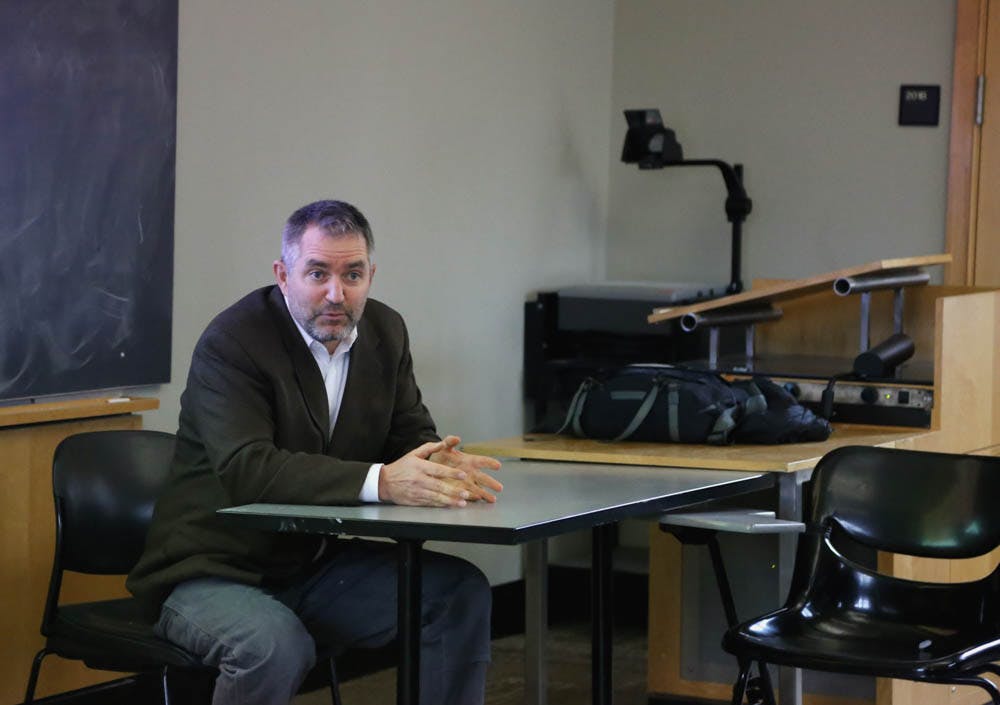C.J. Chivers has been on the front lines, both as a writer and a soldier. The New York Times reporter spoke about his experiences as a Pulitzer Prize-winning journalist and as an officer in the U.S. Marine Corps in a writing workshop and speech Tuesday.
Chivers began the talk by heavily critiquing three videos of war coverage, two of which were his own journalistic work. Referring to journalism as a “first draft of history,” Chivers said there is inherent weakness in war coverage.
Playing a video that showed an exchange of gunfire between Taliban and U.S. forces in Afghanistan on Valentine’s Day in 2010, Chivers said the coverage showed some of the confusion and frustration of battle. “Now I’m gonna say something: As the person who shot that footage and helped edit it … and voiced it, that report is wholly insufficient.” Questions of what happened to the soldiers and the civilians went unanswered, he said.
Though the other videos were “a lot better than no report at all,” they similarly left information out of their reports. The coverage didn’t show the experiences of women or of non-violent resistance. “War isn’t exclusively experienced by men,” he said, even if most of the organizers of war are men.
“This is not a celebration of journalism,” Chivers said. “Everything that you are consuming about war is not enough.”
Chivers decided to join the Marines after the attack of a Marine base in Beirut in October 1983. He said he saw Marines on the cover of Newsweek and identified with them more than with his classmates in school. Even though he was skeptical of U.S. military capabilities and the Vietnam War, he signed up to become a Marine officer. He left active duty in the military in 1994 and immediately went to the Columbia Graduate School of Journalism. He then started working at the Providence Journal, covering North Providence, the Providence Police Department and former Mayor Buddy Cianci. Covering Cianci in Providence was like covering Penguin in Gotham, Chivers added.
After the Twin Towers were attacked Sept. 11, Chivers, who was working at the New York Times, was sent to Afghanistan to cover the war.
Before his talk, a smaller group of students from Brown and the Naval Academy Preparatory School sat down earlier with Chivers to discuss the “civilian-military divide” and the role journalism plays in it. The workshop quickly turned into a conversation about the perception of the military and what it means to serve. Reflecting on Chivers’ own time serving, many NAPS students described their search for meaning in their work and a lack of clarity about what their futures hold.
Mary Lewallen, a NAPS cadet who is formally enlisted and originally from Alabama, said she was glad to get a chance to interact with civilians.
Chivers’ talks were funded by a National Endowment for Humanities grant, according to Jane Gerhard PhD’96, who works on public programming for the project “Irregular Warfare: Experiences Across the Civil-Military Divide.”
“The grant is designed to use the humanities to bridge the divide between civilian and military people,” Gerhard said, adding that the United States is seeing the largest number of former military personnel attending universities since World War II. Half of the grant money helps integrate student veterans into higher education in six different R.I. schools. Gerhard said that three student veterans at Brown participate in the NEH-funded program. The other half of the money is used to create community conversation between the veterans and civilian groups — such as the one Chivers’ workshop aimed to cultivate.
Ava Rosenbaum ’20 said she went to the workshop because she was interested in journalism but was glad she went because “the conversation didn’t revolve around that.”
“I got to hear perspectives from people I don’t get to interact with on a day-to-day basis,” Rosenbaum said, adding that it was “hugely rewarding and eye-opening.”
A student from the University of Rhode Island in the audience asked Chivers what advice he had for someone hoping to become a war correspondent — “War reporting? Don’t do it.”
“It’s really bad for you, and it’s not going to make a difference. … You’re probably going to get hurt,” he added, explaining that many war journalists develop drug and alcohol dependencies and experience failed marriages. Pointing to his children in the back row, he said he was gone for years at a time covering different conflicts.
“I’m not gonna pretend to be fine, you should try to see me sleep,” Chivers said.
“I know very little of what I did mattered because bureaucracy dragged on,” he said. “But I’ve accepted it, I’m working on the margins, just trying to do my description accurately.” Despite his reservation about journalism’s ability to create systemic change, he says he still believes in the field.
“The human connection that comes with this job can be incredibly potent and valuable,” Chivers said.





